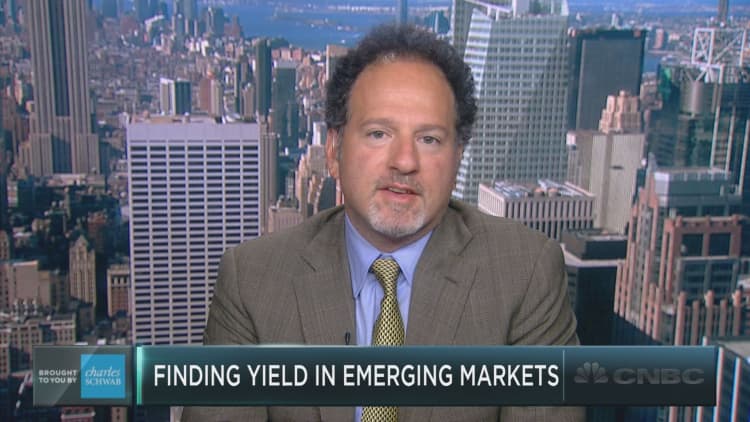
Investors have flocked to emerging markets recently.
In fact, each of the past 10 weeks has seen net inflows into emerging-market debt and equity, with the former seeing its biggest 10-week inflows ever, according to recent Bank of American Merrill Lynch data.
This is part of the global hunt for yield. Emerging-market bonds are seen as more likely to default, and thus offer higher compensation to investors.
"It's a good call, but be careful about the herd of dumb money," Zachary Karabell, head of global strategy and senior consultant for Envestnet, said Friday on "Trading Nation."
From a fundamental perspective, the bounce in commodity prices has been welcome news for the emerging markets, many of which are highly commodity dependent.
"The concern last year and into this year was that the incredible collapse of the commodity cycle would lead to huge defaults in emerging markets, particularly those markets like Brazil and South Africa and elsewhere that were really exposed to that," Karabell said. And while that fear has passed, he continued, investors should be cognizant of hunting for yield without considering the underlying fundamentals that may weaken emerging markets and their economies.
In the note Friday, Bank of America Merrill Lynch said the emerging-market trade has not yet sent a message for a sell signal, noting the bank would need to see "huge" $10 billion inflows this week to trigger such a call.
Asset management firm BlackRock called inflows into emerging markets "The Great Migration" in a note released this summer on emerging-market debt strategy, in which it maintained a positive outlook on the sector.
BlackRock called emerging markets a stable environment for investors, forecasting growth following Brexit fallout, so long as said fallout remains "locally contained."
The firm in February expressed confidence in the sector, when the firm declared the end of what they called a "three-year bear market" for emerging markets following the easing of "three key headwinds" — a strengthened dollar, falling commodity prices and uncertainties surrounding China's growth. This came after the British referendum in late June, after which central banks appeared to be "dovish" despite immediate market turmoil, in BlackRock's view.
Last week's end saw a turbulent time for the sector. The MSCI Emerging Market equity index has rallied more than 17.5 percent following the British referendum, though it dropped nearly 2 percent last week after a five-day rally, the biggest decline since the June vote, according to Brown Brothers Harriman research released Monday.
The firm forecasts a decline "on the magnitude" of the sector. "Here too weakness of US shares, the backing up of US interest rates, and the prospects that the Fed hikes rates, may encourage position adjusting ahead of the end of the quarter," the note said.
Karabell is remaining optimistic on emerging markets, but warns: "Whenever you have a flood of money looking for yield, I just think you need to be cautious of that."





